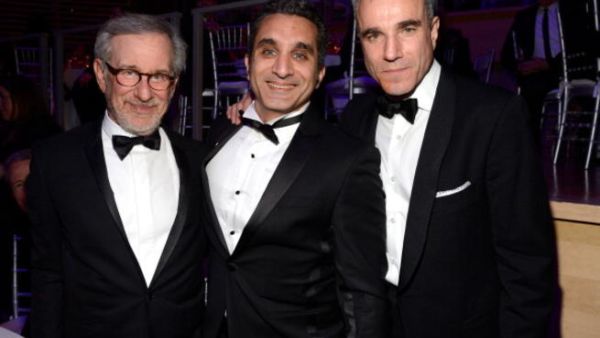Surprise, surprise, Egypt’s ruling Islamists can’t take a joke, certainly not one that hits them between the eyes and comes in the form of a mock news show watched by 30 million viewers.
Through his weekly programme Al-Bernameg, Bassem Youssef has become a thorn in the side of the ruling regime. Now his sharp-witted satire and scathing cynicism have earned him a place in Time Magazine’s list of the 100 most influential people in the world this year.
Youssef is known as Egypt’s Jon Stewart, his programme modelled on the American satirist’s The Daily Show. Al-Bernameg evolved after the 2011 revolution and became an instant sensation, challenging media authority at a time when the media appeared more detached from reality than ever.
Egyptians have a long history of comedy but political satire was rarely public until 2011. Nothing is sacred on Youssef’s show — revolutionaries, Islamists and the president are all fair game — though it is Mohamed Morsi and the Muslim Brotherhood that have been the focus of much of his material since they came to power only to preside over a downward spiral disasters. They are, says Youssef, “bad politicians who seek power in the name of religion”. In one episode after another the satirist has elaborated on his central thesis, that “those who harm Islam are the Islamists themselves” not the ordinary devout Muslims whom they label as apostates. Youssef reserves the bigger part of his show to ridicule the Islamists’ arbitrary decisions and expose their deceits in a comic context, using subtle wordplay and a rubbery face.
But the Islamists aren’t laughing. On 31 March Youssef was summoned for questioning by Morsi appointed Prosecutor-General Talaat Abdallah, charged with insulting Islam and the president. Youssef showed up supported by hundreds of his fans who believed that the charges were an attempt by the regime to silence one of its most effective critics.
Youssef was released on LE15,000 bail.
His arrest stirred international concern. On 1 April US State Department spokesman Victoria Nuland said the arrest was part of “a disturbing trend of growing restrictions on the freedom of expression in Egypt”. On the same day Christiane Amanpour, the CNN’s chief international correspondent, interviewed Youssef and Jon Stewart dedicated an 11-minute segment of his own show to the attempt to censor Youssef, remarking how Morsi, “elected in democratic free and fair elections”, was too thin-skinned to tolerate even playful criticism.
“Making fun of the president’s hat and less than fluent English?! That was my entire career for eight years… You should hear what we say about the president we supposedly like,” Stewart quipped. “Silencing a comedian doesn’t qualify you to be president of Egypt… What are you worried about, Mr President? The power of satire to overthrow the status quo?... By the way, without Bassem and all those journalists and bloggers and brave protesters who took to Tahrir Square to voice dissent, you President Morsi would not be in a position to repress them.”
“Democracy is not a democracy if it only lasts up until someone makes fun of your hat.”
Egyptian media authorities threatened CBC which broadcasts Al-Bernameg with closure if Youssef didn’t tone down his show.
“This will not tame my humour at all,” Youssef told the media after his release on bail. “I’m already planning my next show. I’m going to make fun of what happened to me — and of Morsi, who else?”
On 6 April a Cairo court dismissed the proceedings against Youssef and the following day the Supreme Judicial Council urged the prosecutor-general who ordered Youssef’s detention to step down. The request, needless to say, fell on deaf ears.
This is the backdrop against which the 39-year-old cardiothoracic surgeon turned TV host Youssef was listed among Time Magazine’s 100 most influential people in the world. Stewart wrote in the magazine: “Bassem Youssef does my job in Egypt. The only real difference between him and me is that he performs his satire in a country still testing the limits of its hard-earned freedom, where those who speak out against the powerful still have much to fear. Yet even under these difficult circumstances he manages to produce an incredible show: a hilarious blend of mimicry, confusion, outrage and bemusement, highlighting the absurdities and hypocrisies of his country’s rebirth… I am an American satirist, and Bassem Youssef is my hero.”
Time Magazine’s list also included Pakistani teenager Malala Yousafzai whose education and women’s rights activism provoked an assassination attempt by the Taliban, Burmese opposition politician Aung San Suu Kyi, Barack and Michelle Obama, Bollywood actor and political activist Aamir Khan and Kate Middleton.
The honour Youssef received from Time Magazine is a blow to Morsi who in the December 2012 Time Person of the Year Reader Poll received “the largest number of ‘no way’ votes. Despite his unfavourable ranking, his inclusion on the poll elicited a furry of passionate responses via social media,” said the magazine.
Youssef, currently on a three-week break during which he will attend the Time Magazine celebration, faces a deluge of scorn spouted by Islamists and their army of TV sheikhs and presenters. As might be expected the barrage of attacks is crude, an exercise in mudslinging and name-calling that could not be further removed from Youssef’s own satire. He is a Freemason, a demon, a Zionist, a homosexual, a pig, they claim. Youssef treats the insults as a badge of honour. Recently, though, the Islamists decided to step up their attacks. One sheikh who hosts a programme on a religious channel said “a true believer told me ‘Bassem Youssef should be killed’.”
The sheikh continued: “To him I say, ‘not yet.’”
By: Rasha Sadek








